Do you feel like your marriage is in danger? That is probably the easiest way to understand what encompasses a marriage crisis. While, “in danger” seems like a vague definition, our intuition and feelings are often the best guide to gauge the health of our relationships and point out looming danger.
A marriage crisis or marital distress is any hurdle in the marriage which, to the couple, seems too difficult to overcome. The nature of it varies greatly from marriage to marriage, as do its causes and solutions.
To get a better grip on what the most common causes of marriage crisis are, we talked to psychologist Pragati Sureka (MA in Clinical Psychology, professional credits from Harvard Medical School), who specializes in addressing issues like anger management, parenting issues, and abusive and loveless marriage through emotional ability resources.
She also pointed us into the direction of some glaring signs that can tell us if what we are witnessing is indeed a marriage in crisis, and gave us some expert advice on how to survive a marriage crisis.
What Is A Marriage Crisis?
Table of Contents
A marriage can be one of the most important factors that influences a person’s life, their present, and their future. Committing to a marriage can even make or break a person. Inevitably, hurdles or distress that are caused in a marriage have a profound effect on the lives of the entire family. This makes a marriage crisis an occurrence that must not be taken lightly or ignored.
But what is a marriage crisis after all? Pragati explains, “When we talk of a marriage in crisis, it essentially is a stage in a relationship where that sense of connection, so important to a successful partnership, gets compromised.”
Everyone, who is in any kind of partnership, is faced with challenges. But a crisis is an acute stage of a relationship challenge. There could be many types of crises in a marriage. It is possible that the difficulties collected and compounded overtime, so that they are too big to overcome now. Or, a couple is faced with a sudden, huge challenge in the form of an unprecedented trauma. For example, the death of a child, or the revelation of a past secret, or a financial setback.

In such a scenario, a couple tries to overcome the challenge. If the holistic health of the relationship and the individuals involved allow, the couple is successful in navigating the challenge. It would also depend on the extent of the damage done or the trauma experienced. Even the most successful and the healthiest relationships may face a challenge the size of an insurmountable mountain, causing the relationship to crumble under its weight.
But in both cases, what the couple experiences is a state of overwhelm where they find it impossible to deal with the crisis. A couple facing a marriage crisis may experience extreme depression, anxiety, and hopelessness. Communication feels hindered. The effects of it might start showing in the moods and behaviors of not just the couple but other members of the family, especially children.
What Are The Causes Of Marriage Crisis?
When talking about the causes of a marriage crisis, Pragati speaks to the root of the problem. She quotes Esther Perel, a noted relationship psychologist and counselor, who has spoken about the reason modern marriages suffer so much. She says, “This happens because we expect one person to cater to what an entire village used to cater to. You expect your spouse to be your companion, as well as to fulfill your need for romantic love. Both platonic and romantic relationship is expected from the same person. You also expect that you both enjoy the same activities. At the same time, your value system is also part of the mix.”
Pragati adds, “Other relationship experts give other reasons, such as long work hours or misplaced priorities. Priorities – like compromising.” She draws our attention to the importance of the word ‘compromise’. She says, “Some people don’t prioritize the need to compromise saying that it’s okay if we don’t get along, we only get to live once. If you have grown up with a sibling, or you live with your parents, you always have to adjust. Compromise is not bad if you feel you are also getting something out of it.”
She also blames the emergence and prevalence of social media and information overload for the same. Pointing at instances of celebrity weddings, she says, “What happens is people get influenced by reel life or social media. People expect a high dose of romance, which is sometimes not feasible for regular people. It could be because of temperaments, or finances, or disparity in work-life balance. But everyone expects to be wooed like that, with that level of drama or larger-than-life fanfare and lifestyles.”
5 Signs Your Marriage Is Going Through A Crisis
But how do you recognize that what you are going through is urgent or acute enough to be called a crisis. Is marriage crisis a feeling? If yes, then what does it feel like when a marriage is in crisis? Pragati says, “You start feeling that you are very distant from each other, or you feel misunderstood all the time. You may be in the same room, you may be sleeping together, but there is a lot of distance, and there is nothing which can be done about it. In a nutshell, the connection is lost.”
Pragati takes a cue from John Gottman, American psychologist, and his theory of the Four Horsemen of a relationship. Like the Four Horsemen of Apocalypse that indicate the end of time, Gottman theorized Four Horsemen or four behaviors that indicate the end of a relationship. Pragati sees these four behaviors as perfect indicators of a marriage in crisis, and also provides an additional sign in the end.
Related Reading: Practical Steps To Deal With Depression – Our Panel Of Therapists Tell You
1. Criticism
“Constantly criticizing the other person, their clothes, their hair, their habits and mannerism, their skills such as cooking, or the money they make, is a clear indication you are in the red zone of a crisis,” says Pragati. It is an attack on the identity or the sense of self of the other person. It is a behavior that has no other purpose than to cause hurt.
It is important to note that criticism and complaint are two different words. Voicing concerns or complaints, when done effectively, is constructive behavior. Complaints are about issues that need to be addressed. But criticism when done constantly, feels like a personal attack to the person it is intended toward.
Related Reading: Being Married To An Emotionally Distant Spouse
2. Contempt
Constant criticism is always followed by contempt. It is a predictable pattern. When the dose of criticism gets high enough, the person who is showing contempt has automatically switched to being mean and disrespectful.
We complement this toxic behavior by using sarcasm, mockery, ridicule, and showing disrespect. “If you find yourself talking contemptuously to your partner, watch yourself, because that either puts a marriage in crisis, or is a sign of a marriage crisis,” says Pragati.
3. Defensiveness
Being defensive is a natural response to feeling attacked. If you or your partner find yourself constantly playing the defense, it is highly likely that the person is feeling attacked. But a defensive response in the face of a valid concern serves no purpose other than blaming the partner in a passive-aggressive fashion. Pragati says, “When you are defensive, all you want is to justify your own truth.”
This serves as a block in the communication channel and is a clear sign that the marriage is in crisis. On the other hand, in a healthy relationship, an individual’s response to the complaint or concern of their partner is acknowledgment of their feelings and acceptance of responsibility.

4. Stonewalling
Stonewalling is the last stage of this series of fatal behavior patterns of a relationship. It happens as a response to all of the above. In this stage of the relationship, overwhelmed with negative behavior and communication patterns, a person simply withdraws and refuses to respond. This is called stonewalling
Pragati gives an example. “Your partner says something and you go ostrich-like, thinking to yourself, ‘This person never makes sense. There is no point in responding.’” At this point, the communication channel between you and your partner has completely broken down. There couldn’t be a clearer indication that without communication, there is no coming out of a crisis. Emotional stonewalling is a classic ‘what not to do’ when your marriage is in crisis.
5. Abuse
A list of “signs of a crisis in a relationship” is sadly incomplete without abuse. Physical, emotional, sexual, verbal abuse. Abusive relationships are toxic and must come to an end.
If you or your partner is experiencing abuse at the hands of the other, it is a clear indication that your relationship is in deep trouble. Abuse is a pattern and frequently repeats itself. The willingness and the capacity to repeatedly cause harm to the other person is a clear demolition of the foundation of a relationship, and must be taken seriously.
Related Reading: 8 Reasons Women Stay In Abusive Relationships?
8 Expert Tips To Survive A Marriage Crisis
It is possible to reverse a marriage crisis by learning how to manage a marriage crisis. How difficult or easy it would be depends on several factors. Before the determining incident that caused the crisis (or before the series of small events that led to a full-blown crisis), how was the health of your relationship and your bond with your partner? What is the magnitude of the crisis? How equipped are you with the right patterns of communication? How open are you to learn, change, and improve?
Pragati gives her advice on 8 things that could help you learn how to manage a marriage crisis.
1. Seek help through therapy
The state of marriage crisis is the final stage before the marriage or your dead-end relationship completely disintegrates. This is why the first thing Pragati recommends is therapy with a good family therapist, if you can access and afford one. She emphasizes that marriage crisis counseling should be from someone who can also help you understand where you learned your patterns of communication.
She talks about another important benefit of therapy. “In our kind of connective culture, where we are influenced by the expectations of the society, therapy helps you be clear about what you want.”
A therapist can offer a much needed objectivity in the state of marriage crisis. An objective support and guiding system will help you look at the issues at hand with more clarity, and guide you toward realistic solutions. If you are experiencing a marital crisis or a stage of distress in your marriage, Bonobology’s panel of skilled and experienced experts are there to help you.
2. Look at your own early childhood patterns
We all pick up our behavior patterns from our childhood. No matter the length of the marriage – a 7-year marriage crisis, or 20, or even an early marriage crisis – the roots can be traced back to one’s early childhood patterns and attachment styles.
Sometimes, children pick up patterns of how one has to be in a relationship. Whether your childhood needs were met, whether you got enough attention as a child – these will influence your present behavior.
Pragati Sureka, Psychologist
Usually, to work on these things, working with a professional is recommended to be able to manage the emotions that surface. Or introspect and journal about the feelings that come up when you go through conflicts in your relationship. This can help you spot your subconscious patterns of thinking.
3. Manage anger issues
Pragati strongly recommends managing anger issues if you have them. “If you have anger issues, you need to work on them. It’s not about who triggered them. If one person manages themself in the marriage, they are automatically improving the marriage by 50%.”
To be able to effectively work on yourself and your anger issues, you may try various anger management strategies such as deep breathing exercises, positive self-talk, and meditation. Talking through your feelings with a trusted friend is another effective practice to manage anger. Self-help books and online courses aimed at anger management – free as well as paid – are few of the many learning resources that can help you. Additionally, one may consider consulting a therapist to get to the root of anger issues and manage them.
4. Refrain from the blame-game
If we had to tell you what not to do when your marriage is in crisis, it would be this. Do not get sucked in the blame-game. Instead, take responsibility. Pragati says, “If I have to cross the road or drive a car, someone else may jump the light. But it is me who has to be mindful, because I am in the driver’s seat.”
Taking responsibility doesn’t mean you should succumb to pressure, or own up to mistakes that you didn’t make, or compromise with your value system. It means to take charge of your part of the deal. To own up to mistakes that you did make. To look within, and work toward improving your shortcomings. Be it a marriage crisis after 7 years or an early marriage crisis, blame shifting is going to put you in the same negative spiral. Only with active responsibility can two people work in the direction of a solution.
Related Reading: 5 Ways Midlife Crisis Affects Your Marriage
5. Be honest with yourself
Pragati recommends one to be honest with themself and ask, “How authentic am I in my marriage?”, “What is it that I am getting from the marriage?”, “What can I compromise with?”, and “What are my non-negotiables?” You will need honesty and sincerity with your own self at every stage of the process to work your way out of a crisis.
Pragati gives an apt example. “Maybe you figure out that a certain belief of your partner is outside of your value system . But you may still want to be in the relationship because there are children involved, or it is financially necessary for you. You will have to ask yourself what it is that the marriage is catering to. Only then can you start to manage your feelings better.
“You will decide that these are things I can live with, and these are the non-negotiables. In the next stage, you would think of the ten things you can not live with, and what is the one thing you can work on. Either you would want to work on it, or you would let go.” For example, in the case of abuse, you might decide that I cannot compromise with abuse and would rather live a managed separation or divorce.
But for all of this, you will first have to be honest with yourself. Honesty will help you decide your boundaries and pursue a course of action that is right for you.
6. Focus on the problem
When problems escalate or compound over time, it becomes difficult to focus on them distinctly. In fact, what happens is that we find it easier to zoom out of the problem and begin to see it as a fuzzy whole. Gradually, attention shifts from that fuzzy blob of problems and hops onto a single person who we start seeing as the root of our issues.
Pragati asks people to start focusing on the problem without attaching it to or personalizing it with the other person’s behavior. She says, “The problem may be addiction, or unmet expectations, or a dysfunctional family pattern. If you focus on the problem, it might help you look at where your partner comes from or what their value system is. It might help you work toward a solution.”
Related Reading: How Much Is Couples Therapy?
7. Focus on your psycho-spiritual development
Pragati emphasizes on the importance of focusing on one’s psycho-spiritual development. “You can learn to work on yourself, and surrender to a higher power. You realize that there is a power greater than you that can help you get out of the unmanageability in your life.
“Many people think that prayer is a bargaining tool. But there has been a lot of scientific study around positive psychology and mindfulness studies. When you surrender to a higher power, you build your resilience.”
Living meaningfully and consciously can work wonders for a marriage crisis because, after all, a marriage crisis is an individual crisis of two beings. Calling it a lifestyle change, Pragati says, “Daily mindfulness practice works by helping you center your mind, which is the eye of the storm that is the marital crisis.”
Moreover, focusing on your own spiritual development could also provide you with a personal sense of purpose. It will help situate your source of happiness in something that is in your own control. “When you have a sense of purpose and fulfillment, you are less needy in relationships,” says Pragati.

8. Do not lose perspective
One must live with awareness, even more so during a marital crisis. When looking at your own life, as the main protagonist of your own story, it becomes very easy for one to lose perspective. We have the tendency to both underplay or overplay things in an unconscious attempt by our mind at self-preservation. This means we both exaggerate issues which are manageable, as well as ignore problems that are catastrophic.
Not seeing things in perspective also means that we begin to expect drastic improvements with little effort, and feel disheartened only a few days into taking active steps. We must have perspective in all stages of this journey to be able to celebrate small victories, see improvements, and pat our backs.
Do everything in your power to seek perspective of the issue at hand. If you can, look for objective support that helps you see things as they are.
FAQs
The straw that breaks the camel’s back, or the immediate event that causes a marriage crisis, can be anything. There could be several types of crises in a marriage – an unexpected trauma or a seemingly small occurrence in a long list of issues. The immediate cause is not as important as the root causes of a crisis. The root cause could be having unrealistic expectations, or refusal to compromise, or misplaced priorities, or toxic communication patterns. It is best to seek help from a professional counselor or family therapist, if possible. Bonobology has a panel of experts that can guide you on how to navigate such crises.
Marriage crisis is reversible, be it a marriage crisis after 7 years or an early marriage crisis. This means it is possible to come out of it. Experts always recommend marriage crisis counseling with a good marital and family therapist. If you are facing a crisis in your marriage, with adequate help, guidance, and support, it can be reversed.
Final Thoughts
Our interaction with Pragati ended on a beautiful note about John Gottman’s Magic Ratio of 5:1. She tells us, “Gottman had said, for marriage stability, every negative interaction has to be canceled out by at least five positive interactions.” To make things clear, lashing out at your partner or neglecting to do something they asked you to do is a negative interaction. Appreciating your partner, showing affection, or doing something fun with them, is a positive interaction.
At the very end, she adds, “Nurturing through all seasons and all shades of love has to be the true point of a marriage.” Look closely at your life with your partner, and see how many positive and negative interactions you have had with them. When all is said and done, try to manage, maintain, and improve that magic ratio of 5:1.
11 Examples of Self-Sabotaging Behaviors That Ruin Relationships
Your contribution does not constitute a charitable donation. It will allow Bonobology to continue bringing you new and up-to-date information in our pursuit of helping anyone in the world to learn how to do anything.






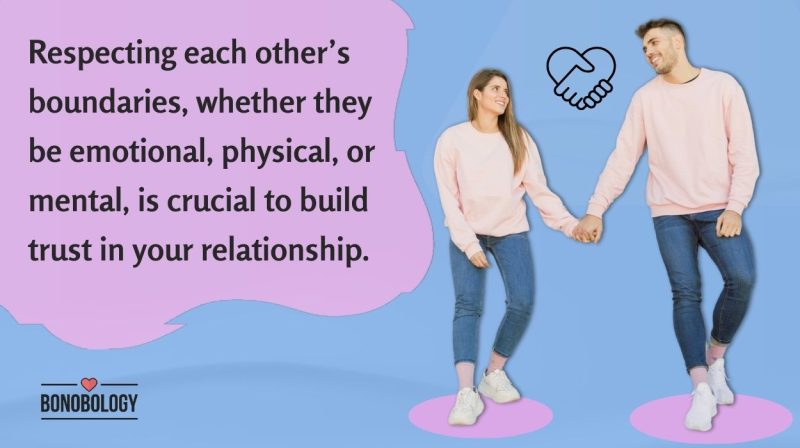



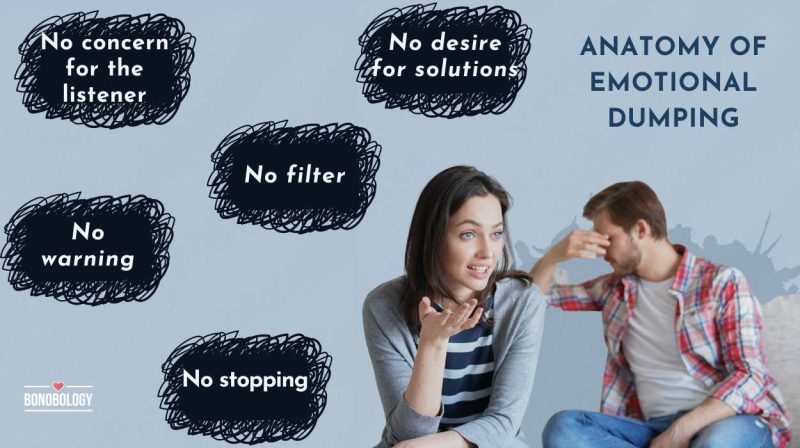






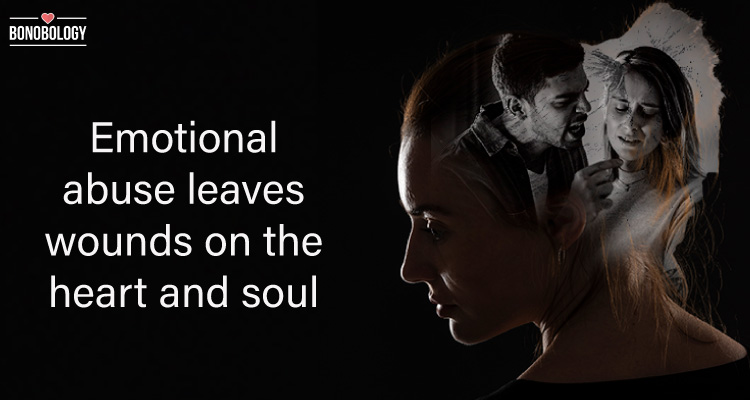


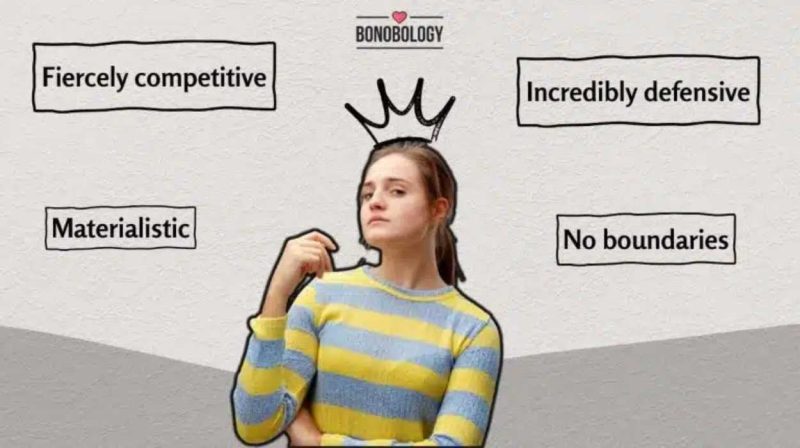
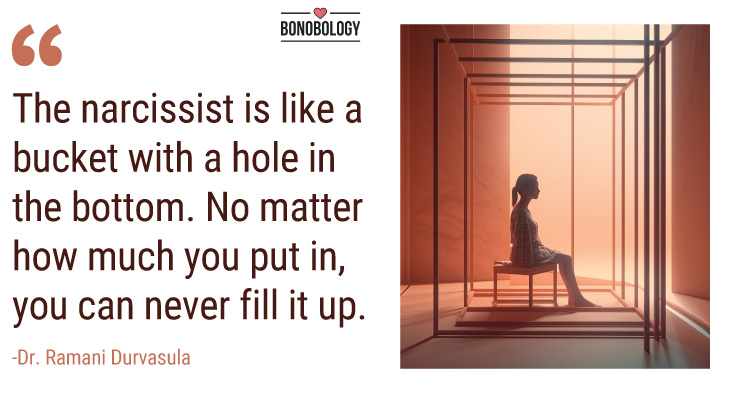

Featured
50 Questions For Premarital Counseling To Prep For Marriage
Why Is Marriage So Hard? Reasons And Ways To Make It Worthwhile
15 Signs Of Being Married To A Narcissist And How to Cope
Building Healthy Boundaries: The Key to Trust and Respect in Relationships
How To Deal With A Negative Spouse – 15 Expert-Backed Tips
What Is A Codependent Marriage? Signs, Causes, And Ways To Fix
7 Signs You Have A Verbally Abusive Wife And 6 Things You Can Do About It
Emotional Dumping Vs. Venting: Differences, Signs, And Examples
Husband Wife Relationship – 9 Expert Tips To Improve it
12 Hurtful Things You Or Your Partner Should Never Say To Each Other
7 Expert Tips To Resolve Conflict In A Marriage
Rediscover The Spark: How To Fall Back In Love With Your Partner
3 Key Skills To Save Your Marriage & Stop Divorce
Roommate Marriage – Signs And How To Fix It
What To Do When Your Husband Belittles You
How To Deal With A Lying Husband?
Why Am I So Depressed And Lonely In My Marriage?
11 Signs You Have A Narcissistic Wife
21 Signs Of A Narcissistic Husband And How To Cope
7 Fundamentals Of Commitment In A Marriage